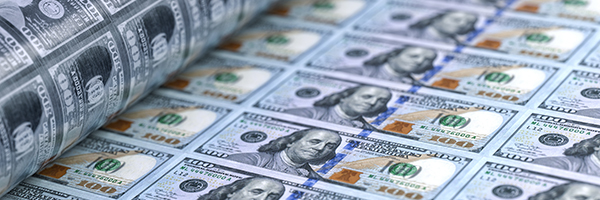 October 22, 2024
October 22, 2024
What You Need to Know Today:
What’s an AI search company startup worth? How about $9 billion? Or maybe $157 billion?
Perplexity AI, an artificial intelligence company building a search product to compete with Google search, is in early talks to raise private-round venture capital at a valuation of about $9 billion, Bloomberg reports.

Making West Pharmaceutical Pick #5 in my Special Report 10 New Ideas for an Old Rally
Here’s what I wrote today when I added this stock to my Special Report.

What’s an AI search company startup worth? How about $9 billion? Or maybe $157 billion?
Perplexity AI, an artificial intelligence company building a search product to compete with Google search, is in early talks to raise private-round venture capital at a valuation of about $9 billion, Bloomberg reports.

Pick #4 in my Special Report 10 New Stock Ideas for an Old Rally–AAL
Today I added American Airlines Group as Pick #4 in my Special Report 10 New Stock Ideas for an Old Rally. Here’s what I wrote.

Saturday Night Quarterback (on a Sunday) says, For the week ahead expect…
Amazon’s (AMZN) earnings report on Thursday, October 24, will start the Big Tech Earnings Parade off with a bang. Wall Street analysts are expecting the company to report earnings of $1.14 a share for the third quarter. That would be up from 85 cents a share in the third quarter of 2023. That would be a 34% jump in year over year earnings. Which would certainly be a great lead in to earnings from Alphabet (GOOG), Apple (AAPL), Microsoft (MSFT) and Meta Platforms (META) the following week.

Tesla has more self-driving problems
The National Highway Traffic Safety Administration (NHTSA) has opened a new investigation into Tesla’s (TSLA) self-driving (FSD) technology over reports of four crashes where FSD software was engaged in an “area of reduced roadway visibility conditions.” Reduced roadway visibility includes conditions like sun glare, fog, or airborne dust.

Special Report: Welcome to the new age of catastrophe capitalism–Part One, what capital markets will look like
Let’s talk today about the changes that global climate change is creating in our capital markets and on the very structure of current capitalism. Part One of this Special Report will look at the nature of the changes. Part Two, later this week, will look at specific implications for your portfolio. Hurricanes Helene and Milton are the perfect case study for the coming changes in capital markets and capitalism.
Live Market Report (20 minute delay)

Making West Pharmaceutical Pick #5 in my Special Report 10 New Ideas for an Old Rally
Here’s what I wrote today when I added this stock to my Special Report.

What’s an AI search company startup worth? How about $9 billion? Or maybe $157 billion?
Perplexity AI, an artificial intelligence company building a search product to compete with Google search, is in early talks to raise private-round venture capital at a valuation of about $9 billion, Bloomberg reports.

Pick #4 in my Special Report 10 New Stock Ideas for an Old Rally–AAL
Today I added American Airlines Group as Pick #4 in my Special Report 10 New Stock Ideas for an Old Rally. Here’s what I wrote.

Saturday Night Quarterback (on a Sunday) says, For the week ahead expect…
Amazon’s (AMZN) earnings report on Thursday, October 24, will start the Big Tech Earnings Parade off with a bang. Wall Street analysts are expecting the company to report earnings of $1.14 a share for the third quarter. That would be up from 85 cents a share in the third quarter of 2023. That would be a 34% jump in year over year earnings. Which would certainly be a great lead in to earnings from Alphabet (GOOG), Apple (AAPL), Microsoft (MSFT) and Meta Platforms (META) the following week.

Tesla has more self-driving problems
The National Highway Traffic Safety Administration (NHTSA) has opened a new investigation into Tesla’s (TSLA) self-driving (FSD) technology over reports of four crashes where FSD software was engaged in an “area of reduced roadway visibility conditions.” Reduced roadway visibility includes conditions like sun glare, fog, or airborne dust.

China tries same old medicine again to address sluggish growth
Minutes after the release of government data that showed the economy grew at just a 4.6% year over year rate in the third quarter (the official target is 5% growth), the People’s Bank of China announced new measures to support the country’s financial markets. People’s Bank Governor Pan Gongsheng flagged the real estate and stock markets as key challenges in the economy that require targeted policy support. the 4.6% growth rate is the slowest pace in six quarters.

Taiwan Semiconductor Manufacturing beats on earnings and raises forecast
Shares of global chipmaking powerhouse rose 9.79% today to hit a record high after the chipmaker topped quarterly estimates and raised its target for 2024 revenue growth. The company—-the main chip manufacturer for Nvidia (NVDA) and Apple (AAPL)–expects sales to climb roughly 30% in U.S. dollar terms this year, up from previous projections for an increase in the mid-20% range. Taiwan’s largest company had raised its outlook for 2024 revenue just a few months ago in July.

Retail sales stronger than expected in September
U.S. retail sales strengthened in September by more than forecast. The U.S. economy continues to show solid growth. And the economic strength continues to say that there’s less need for the Federal Reserve to cut interest rates by a larger-than-usual 50 basis points at its November 7 meeting. The value of retail purchases, unadjusted for inflation, increased 0.4% in the month after a 0.1% gain in August, the Commerce Department reported today. Excluding autos and gasoline sales, retail sales climbed 0.7%.

Good news: What we now know about this coming earnings season
It’s still very early in third quarter earnings season, but I think we can already see a pattern.

Investors decide China stimulus isn’t enough
Chinese stocks fell to the verge of a correction in a sign of growing disappointment over the pace of stimulus rollout.The CSI 300 Index ended the day 0.6% lower, bringing its declines from an October 8 high to nearly 10%. Chinese stocks first rallied strongly on stimulus measures announced by the central bank. The CSI 300 soared more than 30% in about three weeks since mid-September before losing momentum. But they’ve fallen hard on growing skepticism about the power of measures proposed so far to restore growth to China’s economy.

Now that’s volatility! Nvidia was up 2.4% on Monday and down 4.82% Tuesday
I think the only important investing question for Nvidia (NVDA) is whether you want to buy it on the dip for along-term score or whether you want to sell when the stock bounces to a record high and then re-buy on the next dip? In my portfolios I’ve got both a one-term position in my 50 Stocks Portfolio, up 182% since December 7, 2023, and a more trading oriented position in my 12-18 month Jubak Picks Portfolio, where the position is up 22% since September 6 even with today’s loss. The stock was up 16% in the last month as of the October 14 close

Special Report: Welcome to the new age of catastrophe capitalism–Part One, what capital markets will look like
Let’s talk today about the changes that global climate change is creating in our capital markets and on the very structure of current capitalism. Part One of this Special Report will look at the nature of the changes. Part Two, later this week, will look at specific implications for your portfolio. Hurricanes Helene and Milton are the perfect case study for the coming changes in capital markets and capitalism.

CPI core inflation ticks upward; 25 basis point cut in November now consensus
Today, both the headline and the core CPI, which excludes food and energy, came in 0.1 percentage point higher than forecast for the month, with a month to month 0.2% increase in the headline index and a 0.3% rise for the core.On an annual basis, the headline index rose 2.4% in September, slightly less than the 2.5% in August. The core inflation rate, the more important number to the Federal Reserve, accelerated for the first time in one and a half years, to 3.3% from 3.2%. Weekly initial claims for unemployment also came out today, Thursday, October 10, and showed a much-bigger-than-expected increase of 258,000, against the median forecast for 230,000. Together the two reports almost cemented the odds of a 25 basis point cut in interest rates when the Fed meets on November 7.

Adding VMC as the third pick to my Special Report “10 new stock ideas for an old rally
Here’s what I wrote today when I added Vulcan Materials to my Special Report “10 new stock ideas for a old rally.”

Today I made my first 2 Harris picks in my Special Report on election stock winners
Today I added 2 Harris picks to my prior 3 Trump picks.

Of course, neither candidate is taking about the soaring budget deficit
The federal budget deficit swelled to $1.8 trillion in the fiscal year that ended in September, the Congressional Budget Office warned today, Tuesday, October 8. In the recently concluded fiscal 2024 year interest payments on the debt reached $950 billion, larger than the size of the Pentagon budget. As of Friday, the United States had accumulated a public debt of $35.7 trillion.
A perfect storm? War, oil, hurricanes, earnings, interest rates all worry stocks at once
It’s not surprising that stocks fell Monday, October 7. But it is surprising that they fell so little. The Standard & Poor’s 500 was off 0.96% on the day. The NASDAQ Composite dropped 1.18%. Wall Street’s favorite volatility gauge–the VIX–jumped to “just” a two-month high. Look at the negatives arrayed against stocks

Wait! No soft landing! No more rate cuts! The market freaks out again!
It’s back! Fear that the economy is so strong that the Federal Reserve won’t cut interest rates as sharply or as quickly as expected. In the last few days, following on a surprisingly strong September jobs report, the market has gone from giving 50/50 odds to a second large 50 basis point interest rate cut at its November 7 meeting to pricing in doubts that the central bank will deliver even a 25 basis point cut.

Saturday Night Quarterback says (on a Sunday), For the week, ahead expect…
I expect a transition from a market dominated by speculation about the pace of interest rate cuts by the Federal Reserve to worries about earnings and the growth rate for corporate profits.

Albemarle, lithium stocks jump on buy-out speculation
Shares of lithium market leader Albemarle (ALB) rose 8.25% on Friday to close at $102.O9 on speculation in Australia that mining giant Rio Tinto (RIO) will pursue a major lithium deal with Albemarle cited as a possible target. Shares of Arcadium Lithium (ALTM), Lithium Americas (LAC) and Sociedad Quimica y Minera (SQM) also jumped, +10%, +7.1% and +3.1%, respectively. The speculation makes sense to me.



